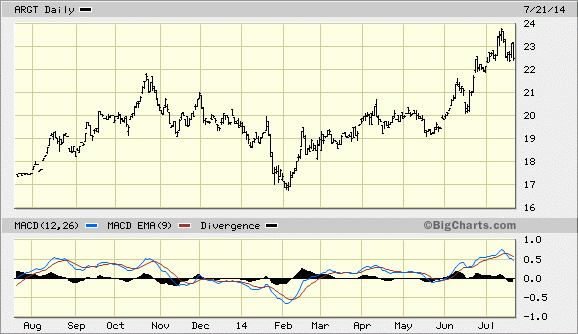One of the recurring headlines adding to the “wall of worry” is the battle between U.S. hedge funds and the Argentina government over payment of the country’s bond debt stemming from the country’s 1998-2002 economic crisis. Pundits worry that a default is imminent and that the country faces a bleak future if fails to pay hedge fund managers $1.3 billion by a court-mandated July 30 deadline.
The U.S. Supreme Court last month confirmed that Argentina must pay holdouts including vulture funds, including Paul Singer’s Elliott Management Corp., if it makes payments on restructured bonds. The case stems from the country’s record $95 billion default in 2002. While 92 percent of creditors agreed to accept a 70 percent loss, some investors sued for better terms. According to news reports, Argentina will default on the 2033 bonds if it doesn’t reach a settlement with holdouts or is granted a delay by July 30.
It is feared that if Argentina defaults it will lead to a wild bout of inflation, complete with out-of-control money printing and general disaster. Will Argentina’s bond market fiasco prove fatal for the country’s economy and financial market? And would such a crisis lead to a ripple effect across the global economy? The jury is still out but the likely answer is “no.”
Consider the evidence of the Buenos Aires Stock Exchange Merval Index. Argentina’s stock market is still flying high after an extraordinary rally since February. The Global X FTSE Argentina 20 (NYSE:ARGT), another reflection of Argentina’s stock market, made a new 52-week high as recently as a week ago.

Let’s assume the country misses the July 30 deadline. If Argentina were destined for trouble then why has the country’s stock market been so strong in the last several months? The implication behind the rally is that insiders and other “smart money” investors know something the rest of us don’t. Regardless of how messy things may get in the very short term, the message behind Argentina’s equity market is that the country should emerge from this crisis without any major long-term hitches.
As for the creditors that were foolish enough to buy Argentina’s bonds, they should have known better. None other than the father of value investing, Benjamin Graham, wrote the following concerning foreign government bonds many years ago: “All investors with even small experience know that foreign bonds, as a whole, have had a bad investment history since 1914.” The book from which this statement was quoted, The Intelligent Investor, is practically the bible of Wall Street. Any money manager worth his salt has a copy of it on his bookshelf (regardless of whether or not it actually gets read).
Indeed, one of the most abiding lessons of the 2008 debt crisis is that borrowers got the benefit of the doubt and sometimes even walked away scot-free from their obligations while creditors got a haircut. This lesson was driven home in another classic book, Freeman Tilden’s A World in Debt, which was written in the 1930s. Tilden surveyed over 2,000 years of debt’s history and observed that credit crises will always arise in an economy which employs usury-based financial instruments. He concluded that every debt crisis ends with the creditor class getting swindled and with the debtors having their debts more or less forgiven. In Tilden’s own words, “If a man could have the longevity of Methuselah, it would pay him to be never out of debt, for he could count on a political upheaval which would relieve him of his burden every so many years.”
The lesson: stay away from risky foreign market investments, especially when there are many more domestic investment opportunities which are far safer.
